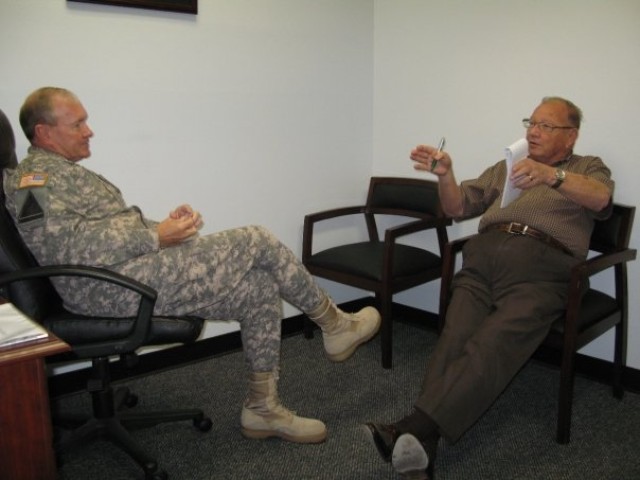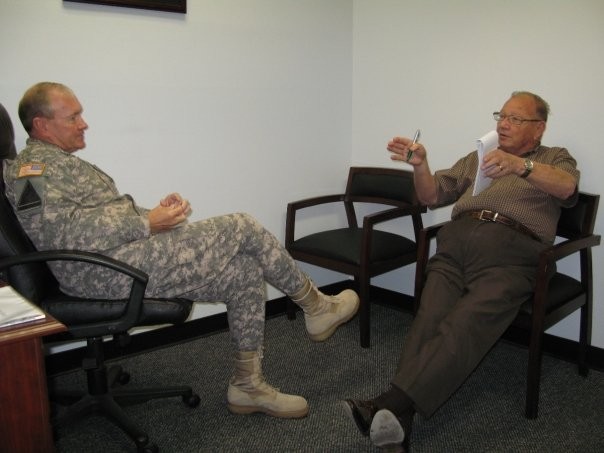FORT HUACHUCA, Ariz. (Sept. 23, 2009) -- Currently, Afghanistan is the major problem facing the United States, a four-star general in charge of training many Soldiers who will end up deploying to that landlocked Asian nation said Tuesday.
"Afghanistan is a very human problem," said Gen. Martin E. Dempsey, who heads the Army's Training and Doctrine Command.
Because of the human aspects in Afghanistan, intelligence Soldiers are a key component in providing stability to that nation, he said.
Tuesday was Dempsey's first trip as TRADOC commander to Fort Huachuca and the Intelligence Center.
Noting there is "no silver bullet" in addressing the Afghan issue, Dempsey said the vision of Gen. Stanley McChrystal, who commands the U.S. and coalition forces in that country, is seeking a way to provide a better life for the Afghans to counter the Taliban influence.
But while the United States continues to be engaged in Afghanistan, as well as Iraq, the nation's armed forces must be prepared for a wide variety of contingencies, Dempsey said.
In today's world, being prepared means the Army can't look a quarter of a century out to see what potential enemies may appear and how to counter them, he said.
"We need to look out in five-year increments," Dempsey said, adding that will give the military the ability to respond to ever-changing global situations.
In the past, the Army was planning for what was thought would be faced far out in the future. As with technological upgrades, security threats change rapidly, Dempsey said, adding the military must be as quick to respond to newer needs.
As an example, he said when it came to development of a future combat system, it was not going to be fielded "until the middle of 2025" and by then, it would have been outdated in light of what has happened, is happening and will continue to happen in today's security environment.
"The future is now," Dempsey said.
Through history, the future has been a changing window providing challenges and opportunities, he said.
What the U.S. must look at is how to prepare its military forces for a number of possibilities from conflicts involving insurgencies to full-scale global war.
Because of that, TRADOC cannot sit back in preparing new Soldiers, he said, and must provide continuing education for noncommissioned officers, warrant officers and commissioned officers.
Additionally, the command ensures there is a cross-culture environment for all members of the Army to understand how the various branches work together, which is a crucial component in today's fight, Dempsey said.
Fort Huachuca is a leader in not only training intelligence Soldiers, but in reaching out to other Army branches, said Dempsey, who began his Army career as an armored officer after being commissioned in 1974 upon graduating from the United States Military Academy at West Point, N.Y.
Dempsey said what he found important was how the Intelligence Center is using current experience coming right from today's battlefields as an integral part of its teaching.
It's no longer PowerPoint presentations, but reality in the classrooms, he said.
Maj. Gen. John Custer, the commander of the center and the fort, "is one of the Army's great thinkers," Dempsey said, adding that the two-star general is innovative in his outlook on how to educate Soldiers and work with the many TRADOC centers.
The Intelligence Center is a key player in providing Soldiers cultural training, an important knowledge base needed as culture is a combat tool, he said.
Absorbing another culture does happen when Soldiers are assigned to countries such as Germany and South Korea, but as Soldiers deploy to places like Afghanistan and Iraq, they must understand the cultures to do their jobs, he said.
Noting that the goal of his command is to create TRADOC centers of excellence, Dempsey said preparing Soldiers for today and tomorrow cannot depend on the tactics, techniques and procedures of the past. On Oct. 1, Fort Huachuca will be named the Intelligence Center of Excellence.
That means there is a merging of some TRADOC functions, the general said.
The goal he wants to reach on the last day he heads TRADOC, the morning he is shaving before a change-of-command ceremony, Dempsey said, is to look into the mirror and know, "On my watch, TRADOC became more credible and relevant in the training of leaders."
(This article is republished with permission of the Sierra Vista Herald/Review.)


Social Sharing